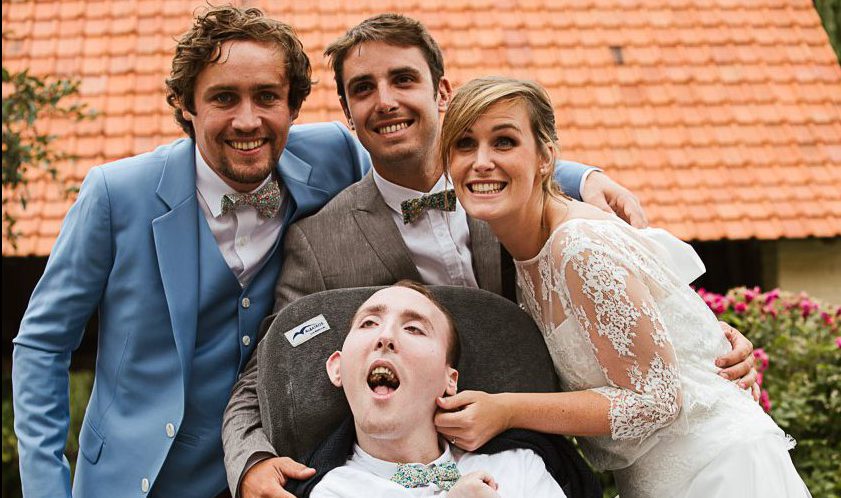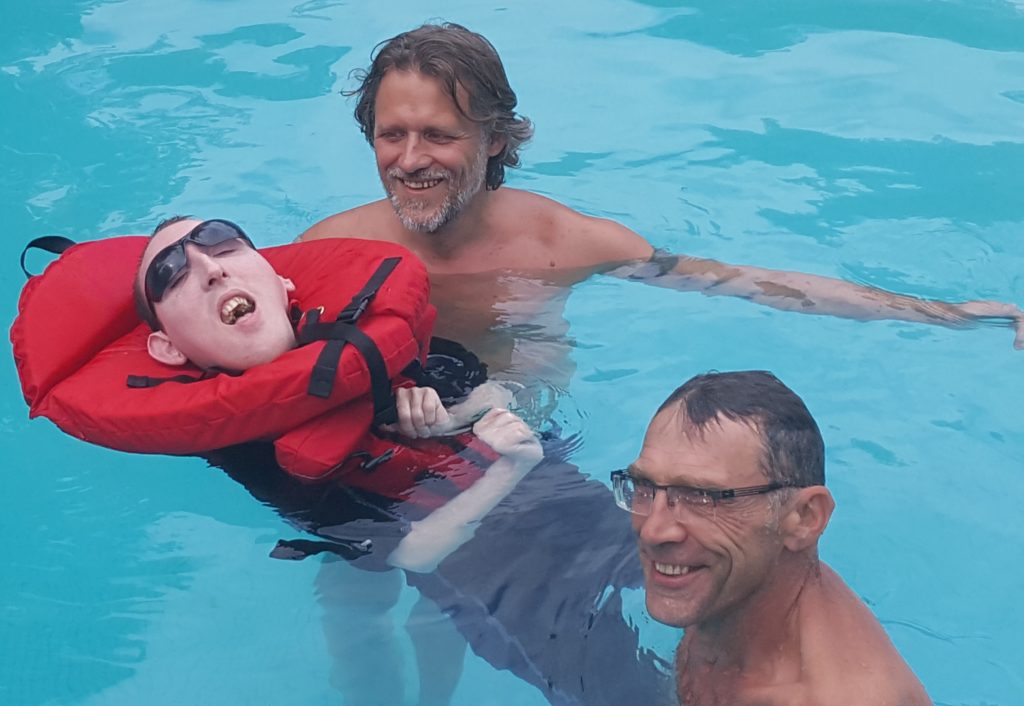Click here for the easy-to-read version
#30yearsofInclusion – Inclusion Europe turns 30 in 2018!
To mark this year, we will be highlighting and celebrating inclusion in Europe in its various forms and practices – and the people behind it.
Every month we will present one person who has brought the Inclusion movement forward in Europe.
Our Inclusion Hero in June is Charles from France.
Charles is a young man with complex support needs. He lives in the north of France.
Charles was often hospitalised in his early days. Throughout his childhood, he alternated between spending time at home with his parents and in specialised services. He was frequently in and out of hospital, requiring intensive medical care. This made it impossible for Charles to have a regular education, family and social life. During these years, his family worked hard to fight alongside Charles for his survival.
Little by little, life started to look up. Supported by his close relatives, as well as social and health professionals, Charles began to open up and challenge other people’s preconceptions of him. With the right support, it became clear he has abilities, for example, to let others know what food he likes to eat on a specific day, or what he wants to do.
Nowadays, Charles still lives with his parents. He joins in community activities as much as possible, supported by his assistants and his family. Charles goes to restaurants with his siblings and friends: even though he eats with a feeding tube, he enjoys the atmosphere and sometimes the flavours. Charles also goes to parties. Initiatives by not-for-profit organisations allow Charles to spend some weekends away from home, in environments adapted to his needs. During his weekends away, he takes part in water therapy.
Charles has built strong links with his assistants. With their support, he lives as regular a life as possible in the community. Charles has become increasingly self-determined. He engages with the world and brings people together in solidarity with him.
The way other people look at Charles has gradually changed, as his family continues to include him through life’s joys and pains. Charles’ life is open to the outside world, even though the lack of accessibility of the built environment remains a big barrier.
There is a lot of uncertainty when it comes to Charles’ future. What will happen if his family circumstances change, so they are no longer able to be in constant contact with his assistants to ensure the best support for him? Who will continue to support him to be an active part of the community, and how can the community continue to benefit from his part in it?
For now, Charles is enjoying the present – this is what matters.
Inclusion Heroes
Our Inclusion Hero of June was Hendrik Jan Menninga, a “UN ambassador”:
“We make sure that the UN CRPD is not just a piece of paper”
Our Inclusion Hero of May was Sami Helle, a musician, self-advocate and politician:
“I chose what felt good. You see: I love music!”
Our Inclusion Hero of April was Gerhard Furtner, the managing director of a company that employs people with learning disabilities:
“This type of inclusion should catch on everywhere in Europe”
Our Inclusion Heroine of March was Dana Migaliova, a mother of a son with intellectual disabilities and president of our Lithuanian member Viltis:
“Parents no longer have to hide their children”
Our Inclusion Heroine of February was Irish actress & musician Aimée Richardson:
“More roles must be written for people with intellectual disabilities!”
Our Inclusion Heroine of January was self-advocate Elisabeta Moldovan from Romania. Read more:
“I experienced a lot of abuse in institutions. I wanted to change this situation for others.”

Easy-to-read version
Click on a word which is in bold to read what it means.
“The life of Charles, a young man from France”
Inclusion Europe turns 30 years old in 2018.
We are celebrating this in a special way:
we are looking at what has been done in Europe
to make sure people are included.
Every month we will talk about one person
who has worked towards inclusion in Europe.
Our Inclusion Hero of July is Charles.
Charles lives in France and he has complex support needs.
Charles was often in hospital
when he was a baby.
As a child, he spent some time at home
and some time in special care homes.
But Charles still often needed to stay in hospitals.
This left him with very little time
to go to school and see family or friends.
Charles’ family worked very hard
to help him.
Little by little, he got better.
Charles began to open up.
Charles showed people what he can do with the right support.
For example, he can now show which food he likes.
He can also show what he wants to do.
Many people now think differently about Charles.
Charles still lives with his parents.
He likes to take part in activities where he can meet people.
He gets support from his assistant and his family.
Charles often goes out to eat
with his family and friends.
He needs some help to eat,
but he likes the smell of food,
and he likes to have lunch or dinner at new places.
Charles also goes to parties.
He also spends some weekends away from home
in places that are accessible for him.
When he is away from home,
he does water therapy.
Water therapy is when you exercise
in the water.
Charles gets along well with his assistants
who help him in his daily life.
Charles now knows how to show what he wants.
Now people are interested in him and his life.
The people around him now see Charles in a different way,
because his family lets him live close to other persons.
Charles wants to enjoy the world outside his home,
but it is not always accessible.
It is not sure what will happen to Charles in the future.
For example, maybe his family will move away.
Then no one could tell Charles’ assistants what he needs.
Then it would be difficult to support Charles
to be a part of his community.
Charles and his family don’t know what will happen in the future.
But for now, Charles is happy.
Our Inclusion Hero in January was Elisabeta Moldovan. Read more.
Our Inclusion Hero in February was Aimée Richardson. Read more.
Our Inclusion Hero in March was Dana Migaliova. Read more.
Our Inclusion Hero in April was Gerhard Furtner. Read more.
Our Inclusion Hero in May was Sami Helle. Read more.
Our Inclusion Hero in June was Hendrik Jan Menninga. Read more.
Find out about our birthday on social media by
clicking #30yearsofInclusion on Facebook and Twitter.







